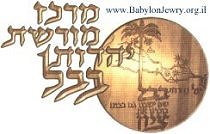Iraq cuts U.S. archaeology cooperation over archives
Al Arabiya News
June 25, 2012
Iraq has cut cooperation with the United States on archaeological exploration because Washington has not returned Iraq’s Jewish archives, Tourism and Archaeology Minister Liwaa Smaisim told AFP.
The fate of the archives, which were removed from Iraq following the 2003 U.S.-led invasion, is a long-running point of contention between Washington and Baghdad, which has for years sought their return.
Smaisim, a member of powerful anti-U.S. cleric Moqtada al-Sadr’s movement, said in an interview with AFP that Iraq will use “all the means” to pursue the return of the archives.
“One of the means of pressure that I used against the American side is I stopped dealing with the American (archaeological) exploration missions because of the case of the Jewish archives and the antiquities that are in the United States,” said Smaisim.
“The American side made many moves and pressure (for Iraq) to resume work with them but this is a final decision,” he added.
The ministry of culture says that millions of documents including the Jewish archives were transferred to the United States.
Seventy percent of the Jewish archives are Hebrew-language documents, with another 25 percent in Arabic and five percent in other languages, according to the ministry.
The archives, which were found in the flooded basement of the intelligence headquarters in Baghdad in 2003, include Torah scrolls, Jewish law and children’s books, Arabic-language documents produced for Iraqi Jews and government reports about the Jewish community.
Iraq was home to a large Jewish community in ancient times but its members left en masse after the creation of Israel and the first Arab-Israeli war in 1948.
“We talked with the American side about the Jewish archives. There are no clear and transparent answers,” said Smaisim.
“They moved the archives in 2003; the agreement that was signed at that time between Iraq and the American side was to bring them back in 2005 after restoring them, but we are now in 2012,” Smaisim said.
Smaisim, who was a dentist before becoming a minister in 2006, said the issue of the Jewish archives was “part of a bigger problem” with the United States, putting the number of Iraqi artifacts held there at 72,000.
“We asked the American side to inventory these artifacts and the Jewish archives … and to send them to the Iraqi side … but they did not respond,” he said.
“All this led to stopping dealing with them since the beginning of the year,” he said, adding that Iraq will “take all steps to get these antiquities and the Jewish archives back.”
When asked for comment, U.S. embassy spokesman Michael McClellen said the archives were in “the temporary custody of the U.S. National Archives and Records Administration (NARA) for conservation, preservation, and digitization.”
“The U.S. Department of State is funding the final phase of the project which includes a bilingual (English and Arabic) educational exhibit of the material in the U.S. and in Iraq,” he said, adding that “all the material will return to Iraq at the conclusion of the project.”
On other Iraqi artifacts, McClellen said that American universities and archaeologists had “engaged in a number of excavations across Iraq that were organized and conducted with the cooperation and support of Iraqi governments,” and that the U.S. works to return any illegally obtained Iraqi antiquities.



